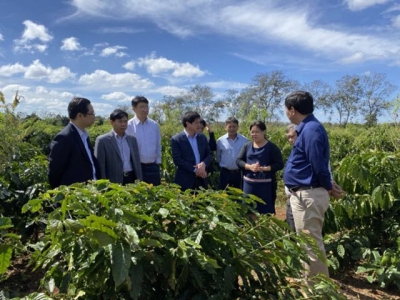VnSAT – A great model of international cooperation in agricultural development

The international cooperation projects including VnSAT have made great contribution to the achievements Vietnam agriculture sector has gained over the past years.
VnSAT's huge impacts on economy, environment and society
Le Quoc Doanh, Deputy Minister of Agriculture and Rural Development said: “The international cooperation projects played an important role in the development of Vietnamese agriculture over the past years, especially regarding financial assistance.
“The Ministry of Agriculture and Rural Development (MARD) is one of the agencies receiving assistance from different international cooperation projects. The achievements reported in all agricultural fields including irrigation, forestry, fisheries and rural development were partially contributed by the international cooperation projects,” Deputy Minister Le Quoc Doanh added.
According to Le Quoc Doanh since 2013 the Asian Development Bank (ADB) supported Vietnam to develop low-carbon agriculture with various projects on reducing greenhouse gas emissions in livestock and crop production. Especially, during the process of agricultural restructuring the World Bank (WB) pledged to help Vietnamese agriculture through the Vietnam Sustainable Agriculture Transformation Project (VnSAT).
Rice and coffee industries, the two key agricultural products of Vietnam were chosen to pilot the project. The VnSAT was implemented in 13 provinces including five Central Highlands provinces (for coffee production) and separately eight Mekong Delta localities (for rice production).
“The project will come to an end by June 30, 2022. So far, all criteria and targets set by the project have been achieved excellently. The implementation of the project has not only brought changes in terms of economy such as the improvement of the yields and quality of rice and coffee but also created positive changes in terms of environment and society,” Deputy Minister Le Quoc Doanh emphasized.
The WB has seen VnSAT as a model project. The MARD is now working with the localities where the project has been implemented to evaluate and have a total view of the VnSAT's impacts on the coffee industry in the Central Highlands.
He said through the VnSAT program rice and coffee production was oriented towards sustainable development. In which not only yields were increased but also costs of production and prices were lowered.
"This is a right approach. It's feasible. All the models can be summed up in technical packages to put into production," said Deputy Minister Le Quoc Doanh.
Deputy Minister of the MARD Le Quoc Doanh also said through the VnSAT, the MARD and the WB along with localities could learn more about drawn lessons and be ready for new partners and new project in the next period.
Promoting sustainable rice and coffee production
After 6 years of implementation, the VnSAT program has reached and even exceeded the targets, having significant impacts on the development of rice and coffee industries as well as agricultural restructuring.
In the Mekong Delta region, the project has helped train 155,780 farmers on 3G3T technique with the cultivation area of 213,663 hectares of which 152,442 hectares met all criteria of 3G3T process exceeding the plan of 150,000 hectares.
Besides, the Mekong Delta provinces have trained 104,448 farmers on 1P5G farming process with a cultivation area of 146,882 hectares of which 113,870 hectares met all six criteria of the 1P5G process exceeding the plan of 75,000 hectares.
Apart from 3G3T and 1P5G techniques, the project has also trained farmers'organizations on management skills, rotation techniques and the use of the by-products of rice as well as VietGAP standards in agricultural production.
Besides, the VnSAT provided financial assistance to farmers' organizations for infrastructure development.
Along with that,52,461 coffee farmers in the Central Highlands provinces were trained on sustainable coffee production under the VnSAT project .
29,234 farming households in Five Central Highlands provinces were trained on sustainable model for coffee replanting.
In the 2021 summer-autumn rice crop, enterprises signed contracts with farmers to purchase paddy rice on 61,000 hectares. In the 2020-2021 coffee crop, coffee enterprises signed contracts to buy coffee on 12,783 hectares.
17,047 out of 28,948 hectares of replanted coffee trees met all criteria of sustainable coffee replanting compared to 10,000 hectares under the plan.
Landscape planning in the selected coffee-growing areas met the requirements of the WB and the MARD regarding the principles of a landscape approach.
With the assistance from the VnSAT, five Central Highlands provinces issued quality certifications to 51 coffee plant nurseries and improved 11 state-owned nurseries and 21 private ones which were qualified for providing 11,6 million coffee seedlings for replanting 11,000 hectares of coffee.
In addition, five Central Highlands provinces set up drip irrigation systems for 190 hectares of coffee and installed sprinkler irrigation system for 249 other hectares with the financial assistance from the VnSAT.
The WB also funded US$50,000 to implement the pilot model of smart irrigation developed by Mimosatek in the two provinces of Dak Lak and Lam Dong.
Over the past time, Vietnam Agriculture News has well-performed its propaganda work for the VnSAT project, contributing to disseminate the good models and results under the VnSAT program, being applauded by the leaders of Ministry of Agriculture and Rural Development as well as local authorities and farmers.
Có thể bạn quan tâm
 VnSAT builds the sustainable coffee value chain
VnSAT builds the sustainable coffee value chain Due to the VnSAT project, Phuong Hoang Cooperative (Duc Co district, Gia Lai province) has become a model in sustainable coffee value chain development.
 Japonica rice - from ‘stranger’ to ’close friend’
Japonica rice - from ‘stranger’ to ’close friend’ Since the rise of quality commodity rice, Hanoi’s ten million citizens have now changed from ‘eating to fill one’s stomach’ to ‘eating to fill one’s palate’.
 Vietnam’s bananas imported into Japan continue to increase sharply
Vietnam’s bananas imported into Japan continue to increase sharply Vietnam’s bananas imported into Japan are on the uptrend over recent years in both quantity and value, especially during the first 10 months of 2021.